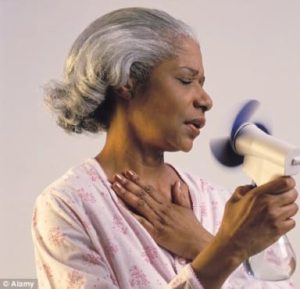
For most women over 50, hot flashes come with the territory of menopause — the period in a woman’s life when she stops menstruating and can no longer bear children.
According to CNN.com, the sudden feeling of being a little hot under the collar is a common occurrence for more than 70 percent of women going through “the change.” But despite the common “it’s getting hot in here” feeling experienced by millions of menopausal women, it is still largely unknown why hot flashes occur and why they affect some women and not others.
A new study out of the David Geffen School of Medicine at the University of California, Los Angeles found that the cause behind the brief moments of heat may actually lie in a woman’s genes.
“We didn’t understand the underlying cause,” said Carolyn Crandall, professor of medicine at UCLA, who led the study. “[But] I suspected there to be a contributing factor from our genes.”
The study, published in the journal Menopause on Wednesday, examined the entire genomes of over 17,000 women who participated in the U.S. government’s Women’s Health Initiative, CNN.com reports. Participants sent in DNA samples and answered a few questions regarding their experiences with hot flashes and night sweats.
Researchers at UCLA then looked for specific variants in the women’s genes known as single-nucleotide polymorphisms (SNPs), hoping to identify any links between the variations and the likelihood of hot flashes. What they discovered was that 14 of the SNPs identified as variants in women who may experience these types of flashes were all located in a particular region of chromosome 4.
This area of the DNA is responsible for encoding a brain receptor that controls the release of estrogen into the body, according to the study. Estrogen levels decrease during menopause, making women much more sensitive to temperature changes within their bodies. Researchers think changes in this particular receptor are associated with whether or not women experience hot flashes.
“There may be something among women with these variants that influences estrogen receptors,” said JoAnn Manson, chief of the division of preventive medicine at Brigham and Women’s Hospital. “… And what’s exciting is that this is consistent with what we know about the biology of menopause.”
The gene variants were also found to be consistent among white, Black and Latino women who participated in the study. Hot flashes are often thought to be more common in African-American women, but “there was no significant variation” across ethnicities, Crandall said.
Now researchers are working to replicate the study with a different set of women, this time paying special attention to that area on chromosome 4 and its influence on the likelihood that a woman will experience hot flashes.
“These are potentially exciting results … as these types of genetic findings are hard to come by,” said Susan Johnson, professor of obstetrics & gynecology and epidemiology at the University of Iowa. Johnson was not involved in the study.
“Although there are not immediate benefits to women with hot flashes from this discovery, it means that we may be coming closer to finding out at least one important reason that women get them,” she continued.
If and when the underlying causes of hot flashes are revealed, the next step for researchers would be to develop a therapy that would help women cool themselves — or just create a treatment that prevents the brief moments of heat altogether.
“This (receptor) may in the future may become a drug target for treatments,” Manson said.


